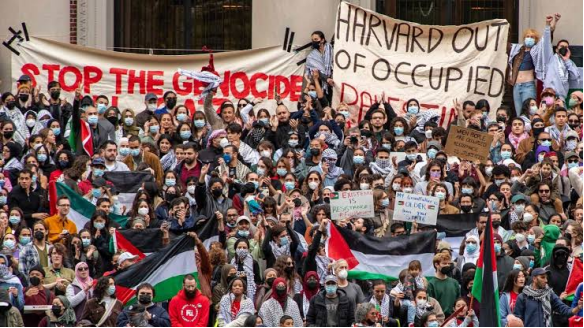
Harvard Criticized for Antisemitism Response: Experts Slam Approach for Ignoring Key Issues
Fiona Nanna, ForeMedia News
5 minutes read. Updated 4:00PM GMT Fri, 5 July, 2024
The prestigious Ivy League institution established task forces dedicated to combating biases against Muslims, Arabs, Palestinians, and Jews. However, the preliminary findings, unveiled in late June, have drawn sharp criticism from experts who accuse Harvard of creating a “smoke and mirrors” approach, more focused on diversity, equity, and inclusion (DEI) than on effectively addressing antisemitism.
Criticism of the Task Forces’ Findings
Liora Rez, founder and executive director of StopAntisemitism, expressed her dissatisfaction in an interview with Fox News Digital. She criticized the task forces for being unbalanced and argued that their recommendations actually exacerbate the problem.
“They actually make things worse,” Rez stated. “There is a task force on combating anti-Muslim, anti-Arab, and anti-Palestinian bias while the other focuses only on combating antisemitism. What about anti-Israeli bias?” Rez contended that antisemitism and anti-Israeli bias on campuses far exceed other forms of bias, and the task forces should have addressed these issues comprehensively.
The Nature of Campus Antisemitism
Rez highlighted that Jewish and Israeli students at Harvard have faced severe antisemitic and anti-Israeli activities, including physical assaults, verbal harassment, social media abuse, and public shaming by fellow students, staff, and faculty. “The task force recommendations do nothing more than continue Harvard’s shameful record of not only not combating antisemitism and anti-Israeli bias, but actually feeding it,” Rez added.
William Jacobson, founder of the Equal Protection Project and a law professor at Cornell University, echoed Rez’s sentiments. He accused Harvard of trying to balance both sides of the Israel-Hamas conflict, despite the reality that antisemitic and anti-Israeli students were the primary aggressors.
“Harvard tries to ‘both sides’ the campus problems, but in reality the anti-Israel and antisemitic students were the aggressors,” Jacobson said. He emphasized that the university is “sanitizing antisemitism under the guise of fighting ‘Islamophobia’.”
The Broader Implications of DEI Policies
Jacobson also criticized the DEI policies prevalent in elite institutions like Harvard, claiming they contribute to antisemitism and anti-Israel activism. “The DEI obsession that has captured particularly elite campuses is the mother’s milk of antisemitism and anti-Israel activism, by pigeonholing Jews as supposedly White oppressors and fomenting racial animus under the banner of decolonization,” Jacobson explained.
He called for a shift in focus from DEI initiatives to respecting each student as an individual, rather than as a representative of a racial, ethnic, or religious group. “Universities should start dismantling the DEI bureaucracies and programming and refocus on respecting each student as an individual,” Jacobson urged.
Harvard’s Response and Future Steps
In response to the criticism, Harvard’s task forces have emphasized the need to create a safe and supportive environment for all students. Asim Ijaz Khwaja, co-chair of the Task Force on Combating Anti-Muslim, Anti-Arab, and Anti-Palestinian Bias, told The Harvard Gazette that the university should focus on what it does best: research, teaching, and enabling substantive, constructive conversations on all issues.
“Highlighting anti-Palestinian bias would also promote inclusiveness of the voice of a large segment of our community that considers themselves allies of Palestinian aspirations, including South Asians, African Americans, Whites, and other groups,” Wafaie Fawzi added.
Backlash and Controversies
Harvard’s handling of antisemitism has not only drawn criticism from experts but has also led to significant backlash from major donors, who have pulled their contributions amid the ongoing controversy. The task forces’ recommendations, which include expanding counseling and protective services and fostering constructive dialogue, have not been well-received by all segments of the university community.
Furthermore, the university has faced additional scrutiny due to allegations of plagiarism against then-President Claudine Gay, which led to her resignation. Harvard Provost Alan M. Garber has since taken over as the interim president.
As Harvard grapples with the complex issue of campus antisemitism, the university’s efforts and the criticisms they face will continue to be closely watched. The final report from the task forces, expected in the fall, will be crucial in determining the university’s future approach to combating bias and fostering an inclusive environment for all students.
For more in-depth analysis and updates on this issue, visit StopAntisemitism and Equal Protection Project.

